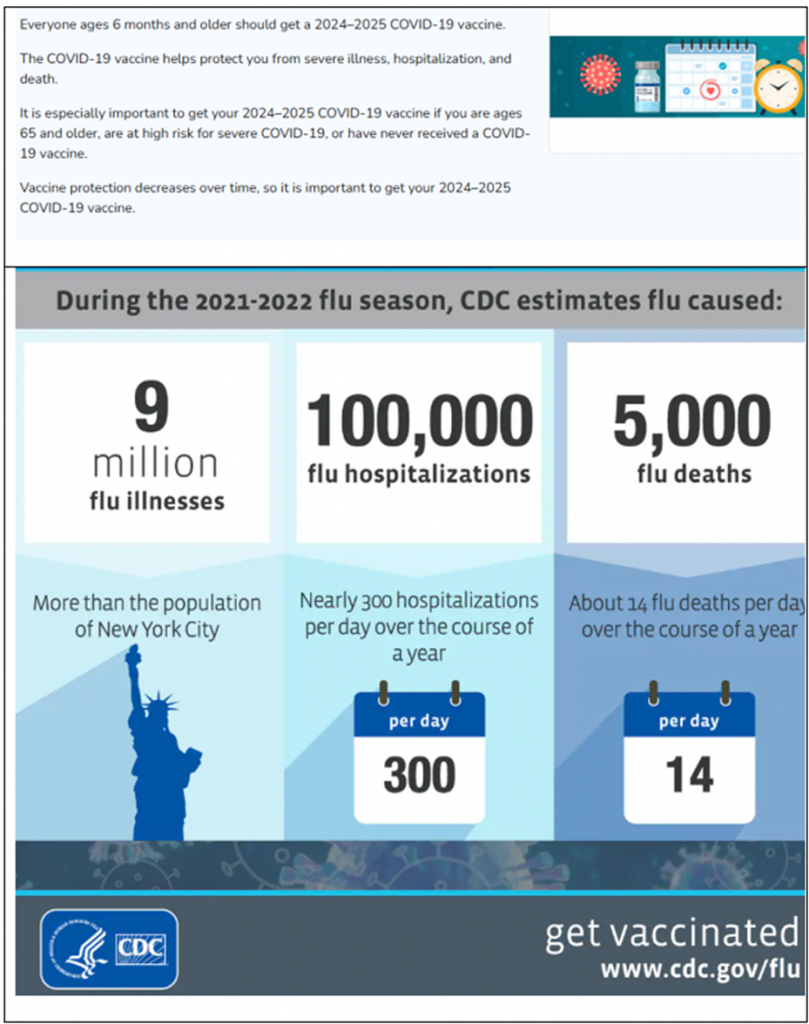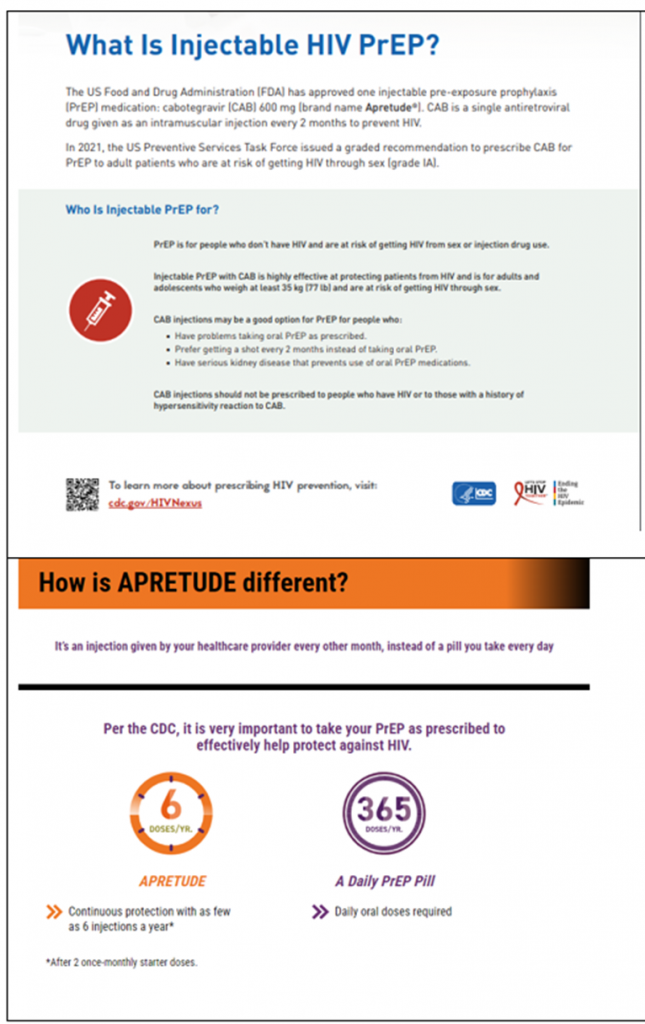News
-
December 23, 2024
PrEP is effective for preventing HIV
Pre-exposure prophylaxis (PrEP) is highly effective for preventing HIV. Truvada and Descovy are the two pills approved for use as PrEP. Cabotegravir (CAB) 600 mg (brand name Apretude) is the only approved injectable PrEP. PrEP reduces the risk of getting HIV from sex by about 99% and from injecting drugs by at least 74% when taken as prescribed. PrEP preventative medication can help you stay HIV-negative, even if your partner might have HIV. See the Figure below. Protect yourself from HIV. IPH is located at 9053 Woodward Ave, Detroit, Monday to Friday, 8:30 AM to 4:00 PM. Call 313-309-9350 ext. 2 for more information on HIV testing, PrEP, PEP, and treatment.

Retrieved from https://www.cdc.gov/stophivtogether/library/topics/prevention/posters/cdc-lsht-prevention-poster-prep-share-the-night-not-hiv-patient.pdf
https://www.cdc.gov/stophivtogether/hiv-prevention/prep.html
https://www.cdc.gov/stophivtogether/hiv-prevention/index.html
https://www.cdc.gov/stophivtogether/sheiswell/index.html
https://www.cdc.gov/stophivtogether/prepared/index.html
https://www.cdc.gov/hivnexus/media/pdfs/2024/04/cdc-lsht-prevention-brochure-clinicians-quick-guide-what-is-injectable-hiv-prep.pdf
https://apretude.com/about-apretude/what-is-apretude/
https://apretude.com/ -
December 12, 2024
Get Vaccinated
Vaccination protects people from respiratory viruses like COVID-19 and Influenza (flu). The COVID-19 vaccine helps protect people from severe illness, hospitalization, and death. CDC recommends that everyone six months and older get a 2024–2025 COVID-19 vaccine. See the Figure below. These include people who have received a COVID-19 vaccine, people who have had COVID-19, and people with long COVID. Protect yourself from COVID-19. Get the updated COVID-19 vaccine. During the 2021-2022 flu season, the CDC estimates flu caused 9 million flu illnesses, 100,000 flu hospitalizations, and 5,000 flu deaths. See the Figure below. The best way to protect yourself against flu is to get a flu vaccine every season. CDC recommends everyone six months and older get an annual flu vaccine. Protect yourself from the flu and its complications. Get vaccinated. The Institute for Population Health (IPH) has the updated COVID-19 vaccine and flu vaccine available at 9053 Woodward Ave, Detroit, Monday to Friday, 8:30 AM to 4:00 PM. Call 313-309-9350 ext. 2 to schedule a home visit or come to the clinic.

Retrieved from https://www.cdc.gov/covid/vaccines/stay-up-to-date.html
https://www.cdc.gov/flu-resources/media/files/2024/07/burden-of-flu-2021-2022-1080×1080.png
https://www.cdc.gov/flu-resources/php/resources/2021-2022-flu-burden.html
https://www.michigan.gov/coronavirus/resources/covid-19-vaccine
https://www.michigan.gov/coronavirus/-/media/Project/Websites/coronavirus/Folder16/Bivalent-COVID-19-booster_v7.png?rev=b0d1cab177214aaeaee857945d76bf02
https://www.cdc.gov/flu/images/resource-center/toolkit/social-media-toolkit/Take3_GetVaccinated_Twitter.jpg
https://www.cdc.gov/covid/vaccines/benefits.html
https://www.cdc.gov/covid/prevention/index.html
https://www.cdc.gov/flu/prevention/?CDC_AAref_Val=https://www.cdc.gov/flu/prevent/prevention.htm
https://www.cdc.gov/flu/highrisk/index.htm
https://www.cdc.gov/flu/prevention/index.html
https://www.cdc.gov/flu/vaccines/index.html
https://www.cdc.gov/respiratory-viruses/prevention/immunizations.html -
October 28, 2024
Know Your HIV Status
In 2022, over 38,000 people received an HIV diagnosis. The only way to know your HIV status is to get tested. Knowing your status gives you important information to help you choose options to stay healthy. CDC recommends that everyone between the ages of 13 and 64 get tested for HIV at least once as part of routine health care. See the Figure below. Protect yourself from HIV. Get HIV tested. IPH is located at 9053 Woodward Ave, Detroit, Monday to Friday, 8:30 AM to 4:00 PM. Call 313-3099350 ext. 2 for more information on HIV testing, PrEP, PEP, and treatment.

Retrieved from https://www.cdc.gov/hiv/images/basics/infographics/cdc-hiv-everyone-get-tested-infographic-1920×1080.png
https://www.cdc.gov/stophivtogether/hiv-testing/talk-testing.html
https://www.cdc.gov/stophivtogether/hiv-testing/index.html
https://www.cdc.gov/hiv-data/nhss/hiv-diagnoses-deaths-prevalence.html -
September 25, 2024
PrEP Reduces Risk of Getting HIV
Pre-exposure prophylaxis (PrEP) is highly effective for preventing HIV. PrEP reduces the risk of getting HIV from sex by about 99% and from injecting drugs by at least 74% when taken as prescribed. PrEP is for people who don’t have HIV and are at risk of getting HIV from sex or injection drug use. Truvada and Descovy are the two pills approved for use as PrEP. Cabotegravir (CAB) 600 mg (brand name Apretude) is the only approved injectable PrEP. See the Figure below. CAB is a single antiretroviral drug given as an intramuscular injection every two months to prevent HIV. Injectable PrEP with CAB is highly effective at protecting patients from HIV and is for adults and adolescents who weigh at least 77 pounds (35 kg) and are at risk of getting HIV through sex. CAB injections may be a good option for PrEP for people who have problems taking oral PrEP as prescribed, prefer getting a shot every two months instead of taking oral PrEP, and have serious kidney disease that prevents the use of oral PrEP medications. See the Figure below. Protect yourself from HIV. IPH is located at 9053 Woodward Ave, Detroit, Monday to Friday, 8:30 AM to 4:00 PM. Call 313-309-9350 ext. 2 for more information on HIV testing, PrEP, PEP, and treatment.

Retrieved from https://www.cdc.gov/hivnexus/media/pdfs/2024/04/cdc-lsht-prevention-brochure-clinicians-quick-guide-what-is-injectable-hiv-prep.pdf
https://apretude.com/about-apretude/what-is-apretude/
https://apretude.com/about-apretude/what-is-apretude/
https://www.cdc.gov/stophivtogether/hiv-prevention/prep.html
https://www.cdc.gov/hiv/prevention/prep.html
https://www.cdc.gov/hivnexus/media/pdfs/2024/04/cdc-lsht-prevention-brochure-nows-the-time-patient.pdf
https://www.cdc.gov/hiv/risk/prep/index.html
https://www.cdc.gov/stophivtogether/library/topics/prevention/brochures/cdc-lsht-prevention-brochure-prep-medication-guide-patient.pdf -
September 11, 2024
Vaccinations Saves Lives
Vaccination protects people from serious diseases like influenza (flu). Flu is a contagious respiratory illness caused by influenza viruses that infect the nose, throat, and lungs. CDC estimates that flu has resulted in 9.3 million – 41 million illnesses, 100,000 – 710,000 hospitalizations, and 4,900 – 51,000 deaths annually between 2010 and 2023. See the Figure below. Pregnant people, young people, people 65 years and older, and people with chronic health conditions like asthma, diabetes, or heart and lung disease are at increased risk of serious complications from flu. The core preventive strategies include immunizations, hand hygiene, and treatment. See the Figure below. CDC recommends that everyone six months and older get a flu vaccine every season, especially people at higher risk. Getting an annual flu vaccine is the best way to protect yourself and your loved ones from the flu. Flu shots are safe for people who are pregnant or breastfeeding. Protect yourself and your children from the flu. IPH has flu vaccine and COVID-19 vaccine available at 9053 Woodward Ave, Detroit, Monday to Friday, 8:30 AM to 4:00 PM. Call 313-309-9350 ext. 2 to make an appointment.

Retrieved from https://www.cdc.gov/flu-burden/php/about/index.html?CDC_AAref_Val=https://www.cdc.gov/flu/about/burden/index.html
https://www.michigan.gov/mdhhs/-/media/Project/Websites/mdhhs/Keeping-Michigan-Healthy/Chronic-Disease/Seasonal-Respiratory-Viruses/RVG-Summary-Graphic-508.pdf?rev=730f7ad240bd4a218c91c891755bc8dd
https://www.michigan.gov/flu
https://www.michigan.gov/mdhhs/keep-mi-healthy/chronicdiseases/seasonal-respiratory-viruses
https://www.cdc.gov/flu/highrisk/index.htm
https://www.cdc.gov/flu/about/index.html
https://www.cdc.gov/flu-burden/php/about/index.html?CDC_AAref_Val=https://www.cdc.gov/flu/about/burden/index.html
https://www.cdc.gov/flu/prevent/index.html
https://www.cdc.gov/flu/prevent/vaccine-benefits.htm



